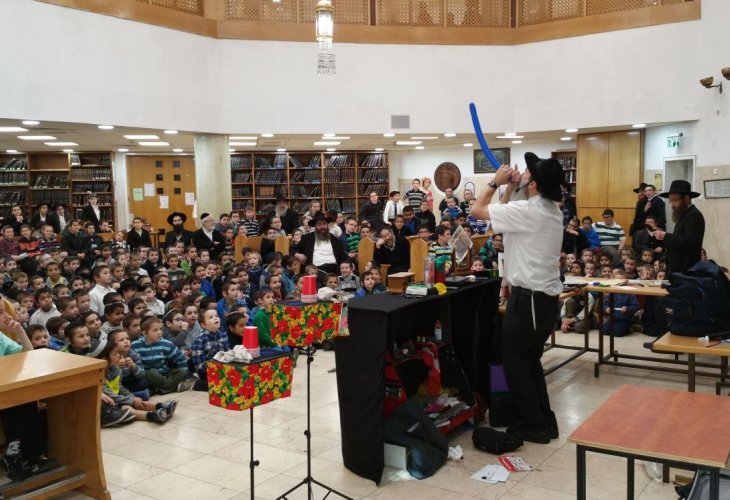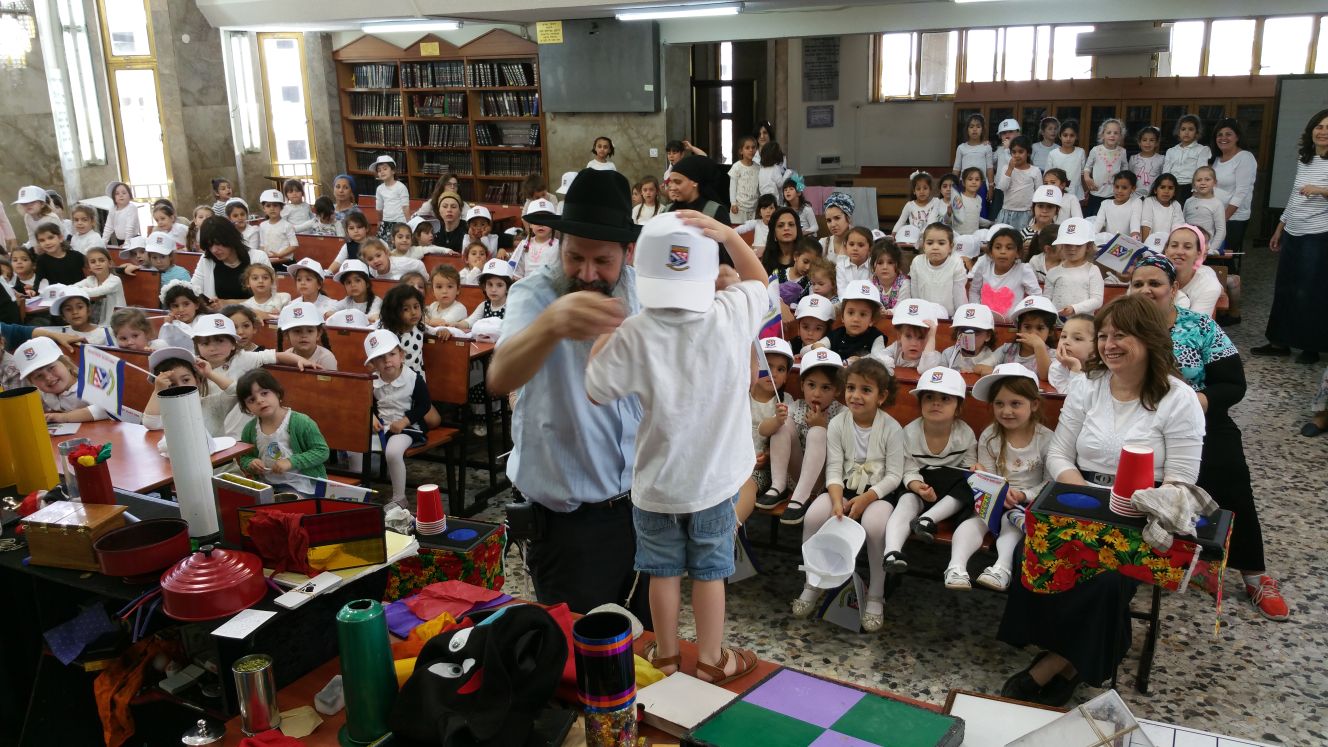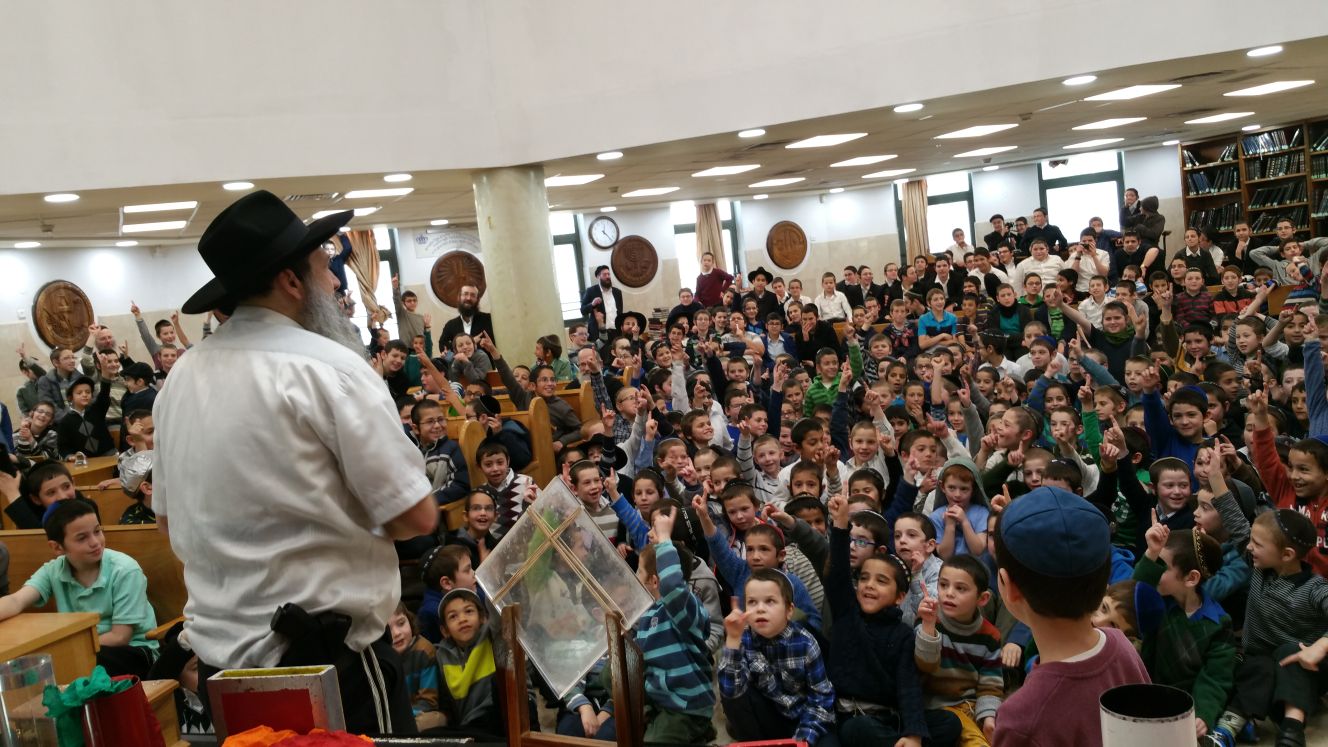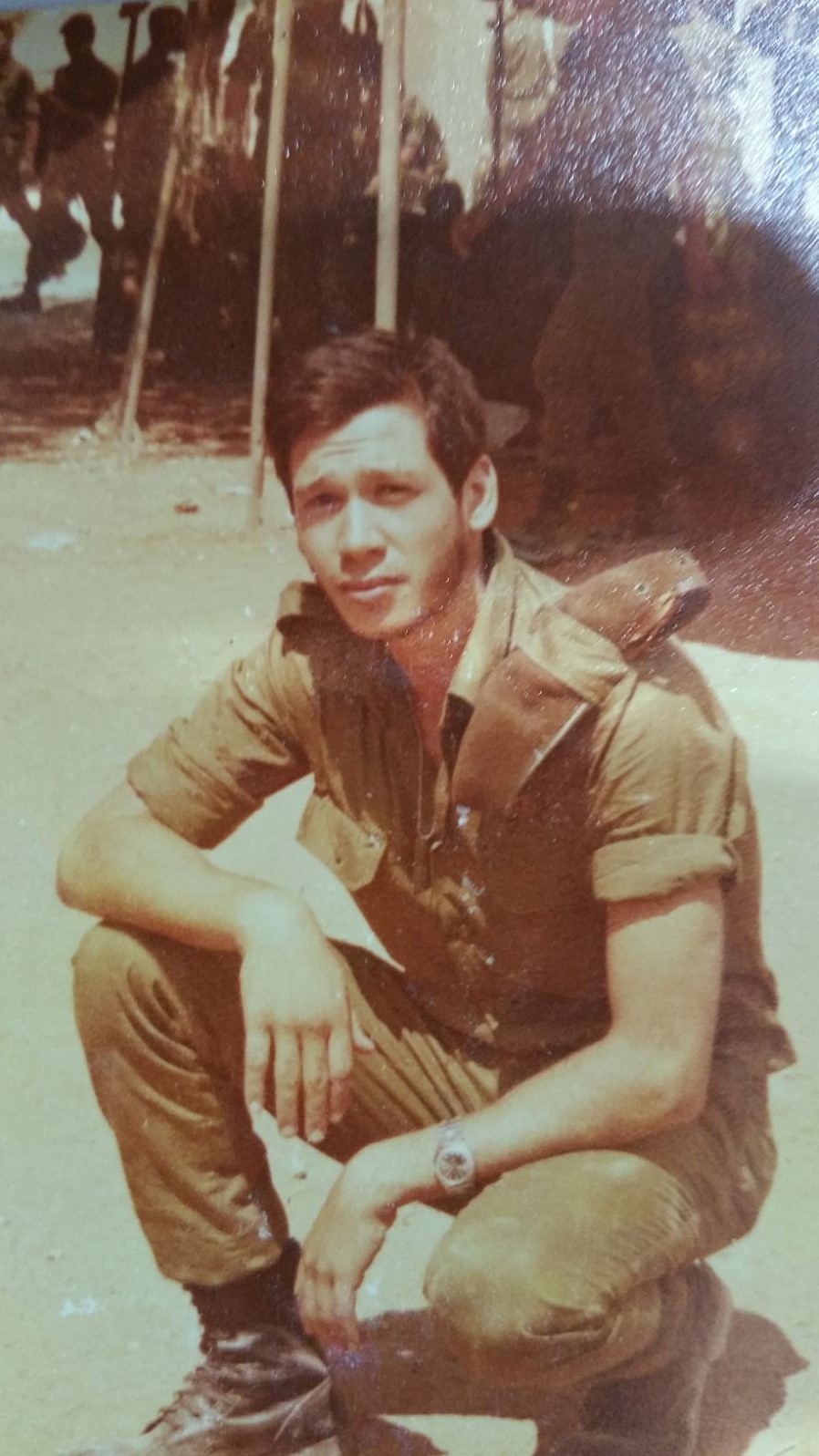Victor Atiya: "I Wanted Hashem to Take Me with My Daughter, I Didn't Want to Live"
Victor Atiya is a stuntman who performs magic shows and telepathy, managing to bring smiles to his audience. Yet, he bears the painful memory of his daughter's tragic death by fire. In an emotional conversation, he shares his experience of coping and how returning to faith gave him strength.

When talking to Victor Atiya, it's hard not to wonder about his character. For a moment, his voice is joyful, he sings and manages to make us smile. However, there are moments during the interview when a tear seems to hang at the corner of his eye, and his voice drops an octave to a whisper, revealing the challenges faced by this outwardly happy person.
Victor leads us to the beginning of his story, several decades ago: "I grew up in a traditional home that was not religious," he begins. "We made Kiddush every Shabbat, but it was what we call a 'movie Kiddush,' with the TV on, and while drinking wine, we watched movies not to miss the suspense. I didn't know much about Judaism, but ever since I remember, I felt that my soul was searching for something."
Step by step, Victor found the right people who helped him discover the truth in life until he joined the army as a penitent. "In the military, there were several like-minded people in my unit; some more devout, some less, some from yeshivas and others just starting out. We became a close-knit group, trying to observe as much as possible. On Fridays, we would buy mehadrin kosher chicken, use the spices from the kitchen, and prepare a Shabbat meal. We dined together, each taking a turn to share a Torah insight. The diversity of our backgrounds enriched the special atmosphere."
Shortly after the army, Victor was offered a match with the daughter of Rabbi Nachshon, one of the founders of the Jewish settlement in Hebron. The match materialized, and Victor moved to Hebron with his wife, becoming an official emissary there. Eighteen years ago, another enthusiastic emissary joined him, Dani Cohen, who took on many responsibilities and strengthened the community. Rabbi Yosef Nachshon, Victor's brother-in-law, also contributes to the mission and helps as much as he can.
"Come Home, Chaya Mushka is on Fire!"
Victor's mission in Hebron occupied his entire day and connected him deeply to the place, raising his children there in peace and tranquility until the darkest day of his life when the terrible tragedy occurred as Chaya Mushka, his eight and a half-year-old daughter, was burned in flames.
Victor recalls that profoundly dark day, about 11 years ago: "I was visiting a friend in mourning when suddenly I received a phone call from my wife. When I answered, I heard her scream: 'Victor, come home quickly, Chaya Mushka is on fire.' Then the call was disconnected.
"I felt like the sky was falling," he remembers, "Of course, I immediately got into the car and drove home. It was not an easy ride. I live in one of the new neighborhoods in Hebron, and outside my house is a large playground usually bustling with mothers and children. When I arrived, there was not a soul. It felt like entering a ghost town, sharpening my fear that the worst had happened. When I got out of the car, one of my close friends approached me. I asked him: 'Avraham, they couldn't save my daughter, right?' He hugged me tightly and said: 'Victor, blessed is the True Judge.'"
Victor says there is no way to describe the feelings at that moment. "It seemed impossible, how could it be that my daughter Chaya Mushka, full of life and laughter and a part of my very soul, no longer existed? I felt as if I were telling Hashem: 'Take me with you; I don't want to live. I just want to be with my daughter.'
"But then an image came to my mind, and I remembered something that happened a few days earlier at home – one of my older sons walked past his younger brother and, out of boredom, smacked him on the neck and ran away. I stopped him and said: 'That wasn't nice, why did you do that?' He just hid under a blanket, pretending not to hear. I distinctly remembered scolding him: 'The words 'escape' and 'choice' share the same letters, you can choose to face what I told you and improve, or you can escape.' I realized that I needed to say these things to myself as well. But I still felt incapable. There was a sharp pain in my chest that I couldn't release from. I found myself looking up to the sky, just praying to Hashem: 'Give me strength to deal with this disaster, to comfort my wife and children, to emerge stronger.'"

And what really happened there? How did it occur?
"Later I understood that probably Chaya Mushka and her five and a half-year-old brother were playing with a box of matches outside the house. There's a structure surrounded by a rectangular area where one or two children can enter. Someone had thrown leftover Sukkot dried branches there and the cleaner didn't remove them.
"My children were likely playing with matches, and the branches caught fire. The little boy saw that Mushka's dress was on fire and shouted: 'Throw off your dress and run!' Children in the area later told us that Mushka started shouting 'Save me! But I won't be modest,’ and instead of running away, she hid under unburned branches. Of course, in such cases, halacha does not require modesty at all. On the contrary, she should have thrown off the dress at that moment. But in a child's innocence, that's how she felt. Then the branches caught fire, and the heat captured her; she had nowhere to escape. A neighbor heard the screams and tried to extinguish the fire but couldn't. The fire services didn’t arrive in time, even though the fire station was just 150 meters away. It was a matter of seconds, and by the time my little son called my wife, the neighbors had already stopped her from reaching the scene. There was no one to save."
When Victor talks about it, he emphasizes: "At first, I felt guilty, tried to blame the street cleaner for not removing the branches, and also blamed the one who threw them there. But over time, I realized how everything happens precisely and under divine providence. All these were Hashem's messengers."
Victor mentions knowing that a group of Jews from Hebron approached Rabbi Mordechai Eliyahu ztz"l after the incident and asked how it could be that a Chabad emissary, who spent his life in outreach and strengthening faith, experienced such a disaster. The Rabbi answered that the child's soul descended to this world to strengthen the matter of modesty.
"The day before the disaster," he adds, "I was at my parents in Bat Yam when I suddenly got a phone call from my wife who said she returned home to find the house clean and tidy, as Chaya Mushka had cleaned it. Of course, I praised Chaya Mushka very much. Later, my wife asked her: Why did you suddenly decide to clean? She had never done it alone before, and Chaya Mushka shyly replied: 'I wanted you to be happy, Mom, because tomorrow many people will come to our house.' My wife, of course, didn't imagine how many people were really coming, but looking back, we understood Mushka might have felt something was about to happen..."

"Where is My Daughter in the Universe?"
As mentioned, eleven years have passed since the disaster but Victor notes the pain is still burning and tangible. "In the first year, the intensity of the pain was very strong, it didn’t leave me for a moment. I remember opening the holy letters of the Lubavitcher Rebbe one day. It opened to pages written in Yiddish, which I do not understand. However, there were two Hebrew words: 'akamida' and 'charity.' I couldn’t help but feel how these words fit what happened here. I thought about how what my daughter went through was a complete akedah and decided to strengthen myself by setting up charity canisters in her memory.
"Throughout the seven-day mourning period, I had a very hard time. The evenings were particularly difficult because during the day, people would come in constantly, talk, and there was activity. But at night, it was just you, your wife, and the Creator. At night, I always felt the darkness envelop me from every direction. I couldn’t believe this was my reality, being in this nightmare. One night, as I went to cover my children, I first entered the boys' room and saw that the blinds were closed, and they were all covered. Then I moved to the girls' room and felt a cool breeze. I looked at the beds and saw my eldest daughter in her bed and Chaya Mushka's bed empty. I felt this enormous void in the house. I turned to the window, my eyes stuck on the sky. It was dark and gloomy, and I started mumbling: 'Master of the Universe, I'm a believing Jew, but just a week ago, there was a girl in this bed. Where is she now in this whole universe?' I felt so small and understanding nothing. I went to sleep that night and soaked my pillow with tears, constantly thinking of my daughter, hoping she is well and not suffering. I barely slept an hour or an hour and a half, and when I got up, I understood more than ever what we say in prayer: 'As a father has mercy on his children,' because there's nothing on earth that compares to a father's mercy for his kids."
As the days passed since the disaster, Victor realized he wanted to amplify his activities in Hebron in memory of his daughter and expand it as much as possible. "Rabbi Gluckowski, one of the famous Chabad rabbis, advised me to establish a building in her memory because a building has the power to heal," he explains. "It was very challenging for me in terms of fundraising since I’m not the type who knows how to raise money, but my partner at the Chabad House helped me, and over six years, we raised funds in Israel and worldwide. Eventually, we built a three-story building with a synagogue, a large library, a place for activities with children, and also conference halls and a hospitality area where we host soldiers, especially during operations in the Hebron area. They always know that our center is open, and they can come to shower, eat, and rest."
 Victor in his youth
Victor in his youthCrying Eye, Laughing Eye
Amazingly, despite the sorrow that hasn't been forgotten, you can currently find Victor engaging in shows filled with laughter and humor, as in recent years he has become highly skilled in magic and telepathy performances.
How did you enter the field?
"The truth is, it began when I was fundraising in the USA. I was in a store and suddenly saw a non-Jewish guy enter with a wallet, which he opened as if to take out a bill, and then fire burst out. He closed it, and fire emerged again, and then he left behind a business card saying he does magic and telepathy shows, and left. When he left, I thought about how he managed to captivate everyone in the store, and suddenly I knew that if I wanted to engage in a field that interests everyone, both kids and adults, then this was the way. Of course, it didn’t happen overnight, but gradually I started meeting people in the field and inventing my own methods and ideas. Today I often go to performances but always stress to the audience the connection between the magic and the things I do to Judaism. For example, if I bend spoons, I tell them: 'See? The spoon bent, and the handle went up. It shows that those who forgive and forgo can elevate.' Or when I do a stunt where I seemingly appear as strong, I emphasize: 'Strong means overcoming, those who can overcome and forgo.' Today I perform throughout the country and even abroad.
"I embraced the insight to choose life," he concludes, "The word 'wise' includes the words – 'half a glass full.' I choose to look at my good fortune in having had my wonderful daughter for eight and a half years; I am grateful for having eleven wonderful children, I have a reason to come home, which heals my soul. I also thank Hashem every day for drawing me closer to Torah and tradition because it is clear to me that if I had not returned to faith before what happened, I wouldn’t have survived this grief. Because there is no doubt that when you're in pain and you even don’t understand that someone sent you this pain, then the sorrow is much stronger."

